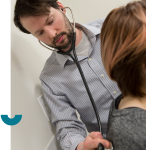Share
Practice Checkup: An opportunity to reflect, learn and grow in your practice
Back to MessengerRead time: 3 minutes
The newest MD Snapshot-Practice Checkup will be coming this summer to the Physician Portal, providing physicians with high-level data about how various factors they face every day may have an impact on their practice. Based on evidence, these factors include areas such as age, gender, practice location and teaching status, among others. The tool then uses three outcomes to measure the proxies of risk: number of complaints, opioid prescribing and benzodiazepine prescribing.
New this year, Practice Checkup will feature an interactive layout that includes opportunities to interact with the data (e.g., ability to compare across specialities) and embedded research links that can potentially help inform or mitigate risk.
But the question often arises, how can one mitigate risk when certain factors, such as age, can’t be modified? CPSA Senior Medical Advisor Dr. Nigel Flook shares the following analogy:
“If a patient comes in with cardiovascular issues, we look for risk factors. The patient’s age, gender and family history all play a part, and are non-modifiable. At the same time, we also consider the patient’s cholesterol levels and personal habits, such as smoking. These we know can be modified. In this scenario, we don’t just ignore the non-modifiable factors; we have other tactics we can employ to mitigate the risks and try to reduce them.”
So, what are some tactics physicians can consider when reviewing their Practice Checkup data?
For those who fall into the solo practitioner category, it’s not reasonable to assume the only option to mitigate risk is to join a group practice. Instead, a physician could look at joining a small learning group to share experiences and resources, or get involved with their local PCN. If they’re responsible for after-hours care in their community, they could join an on-call group to ensure support is available if they come across challenging emergency situations.
When it comes to age, physicians tend to develop habits over time and some might find themselves cutting little corners here and there. In addition, age often correlates to experience, but relying solely on that experience and gained intuition can actually be detrimental if physicians are out of touch with best practices and new evidence. To mitigate this risk, one suggestion is to go back to the basics and rely on strong clinical process, including exploring a patient’s history and researching current clinical guidelines and evidence.
Gender can often be a controversial factor when assessing risk, but it’s important to first acknowledge the lack of diversity currently represented in the Practice Checkup (populated using data from the annual Renewal Information Form). Please know CPSA is working diligently on this as part of a greater equity, diversity and inclusion initiative.
Under the gender tab, physicians will find an outcomes graph that shows male physicians are slightly more prone to complaints. While current research is limited on perceptions of gender and quality of care, a recent study found that strong communication skills could be correlated to gender being a protective factor.
Communication can be both verbal and non-verbal, but more important than the messages we send out are the messages we take the time to hear. “Listen more than you lecture,” says Dr. Flook. Being respectful and considerate of a patient’s feelings and lived experiences can go a long way in creating a safe space for patients.
| Did you know? Reviewing, analyzing and developing an action plan based on your Practice Checkup counts as completing a practice-driven quality improvement activity using objective data under CPSA’s new Physician Practice Improvement Program (PPIP). |
Want to learn more about CPSA’s Research and Evaluation Unit (REVU)? Read more about REVU and their work in evidence-based medical regulation, including a published qualitative study on experiential knowledge of risk and support factors for physician performance in Canada.
























Comments for this post are now closed. If you would like to share your feedback on this topic, please email support@cpsa.ca.